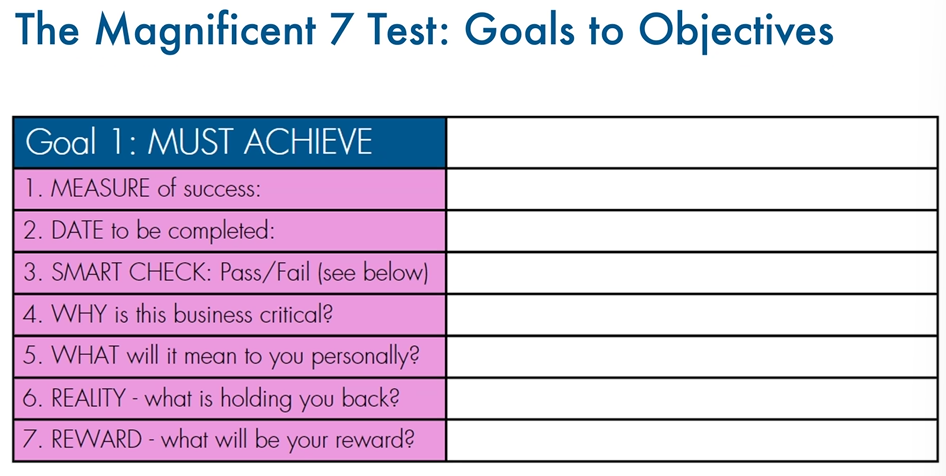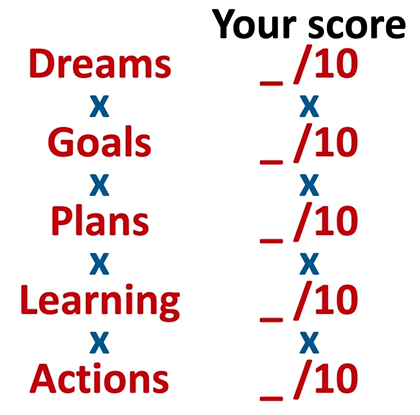
DGPLA – the Formula for success
Dreams X Goals X Plans X Learning X Actions
Dreams
Dreams drive our motivations and inspiration. They are the starting point of your business cause, they give you your vision and your mission. They are evolving constantly and not simply a destination. Why are you running a business? If it’s just about the money, then that is not a good reason. What are your dreams? Do you know what they are? Do you have a dream board?
In our club today, we had a range of dreams… Ours here is to help create 25 millionaires in the South West – whatever that means to them, whether financially or personally. Duncan Attwood of fit20 Exeter shared his dream of giving people their health back, helping more people be able to physically enjoy their lives. Longer term, he wants to run a campsite, an activity centre, and even a yacht, so that people can fully have fun and thrive. Chris Outlaw is looking to establish an online learning platform for businesses to unlock the full potential of their brand, to have an even bigger impact on what he can achieve for people! Beki Heath at Clean Sweep dreams of the idea of giving people their time back, so they can start to live more life and not lose long hours cleaning. Matt Gajdus is on a mission to give people their clean energy, and one day build his own eco-home through his work at Manta Power.
How often do you express your dreams? The chances are not very often. Why not make a dream board? Collect a whole range of images of your dreams and put it somewhere in your home that you will see regularly. Just remember that dreaming is a verb – it is an active thing. Why not put a weekend aside with your partner to be completely outlandish, write down all the things you’d like in the next 5 years, and then set your mind towards achieving them?
Goals
Goals are the numbers, the time scale, the parameters of your dreams. Dream your dreams, but then put things into a practical perspective. When you set a goal, test it with these 7 questions:

Questions 4 and 5 are actually the most important: if you don’t know why it is critical and what it means to you personally then you won’t know why you are fighting for it.
Make sure you view the SMART check in detail; this isn’t just a technicality, it is something that will get you the first steps towards your dreams. There are several versions of this but my preferred use for the letter A is Agreed: when you write a dream down, it exists… but when you share it with others, it persists.

Plans
Plans can be tough to do – but with your specific planning, begin by setting aside exactly how many hours a week you are going to commit to developing your business. Once you have done this, write down your tasks for each week over the next quarter and find a way to instil the discipline to make sure you have time for work ON the business, not just IN the business. Many business owners feel that this is “spare” time but we need to change that mentality: just because you are not “doing” the work of what your business delivers does NOT mean you are not “working”. The time you lock in for working ON your business should be the part of your week that you are most excited about!
Learning
Learning needs to be part-and-parcel of your planning, in a cyclical fashion. When you know what your plans are, along with your dreams and goals, learning is often the missing piece of people’s puzzle. The next time you sit down and plan the upcoming quarter, why not consider what your following one will be? Even if this is just a sketch of the idea, you can get yourself learning during the current quarter so you are prepared for the following. This will then help you know how you can actually set in stone the weekly tasks that will get you to that final goal.
Actions
Actions are the final step. Positive intentions without positive actions lead to positively nothing. Consistency beats intensity – going to the gym routinely is far better than simply running 20 miles on a one-off and then doing nothing beyond. If you aren’t locking in the time at least weekly to developing and improving your business, then it simply won’t happen!
Your score
Take some time now to score yourself for each of these 5 areas. How good are you at doing each?

Once you multiply 10 by itself 5 times, you get the number 100,000. Multiply your scores together to find your own score. We have worked with plenty of people who find that their own score is only in the hundreds… Lots of people limit themselves by not dreaming, or not putting aside time to learn, or simply not taking actions by sticking to their default diary and holding onto that discipline. Think now about your weakest numbers – which ones are holding you back the most? How can you take steps to improve them over the next 6 months?
How can I get better at business planning?
There are several ways you can get better at business planning:
- Study business planning: There are many books, online courses, and resources available to help you learn about business planning. Start by researching and reading some of the best books on business planning, attending seminars or webinars, and taking online courses that focus on business planning.
- Get feedback from experts: Reach out to successful entrepreneurs, business coaches, or industry experts and ask for feedback on your business plan. They can offer valuable insights and help you identify gaps in your planning.
- Practice, practice, practice: The more you practice business planning, the better you’ll get. Try to create different types of business plans, such as one-page summaries, pitch decks, and more detailed plans. This will help you develop your skills in different areas of business planning.
- Identify your strengths and weaknesses: Assess your strengths and weaknesses in business planning. Once you identify your areas of weakness, you can work on improving them.
- Use business planning software: There are many software tools available that can help you create professional-looking business plans, financial projections, and marketing plans. Consider using these tools to streamline the planning process and improve the quality of your plans.
Remember that business planning is an ongoing process. The more you do it, the better you’ll get. Stay curious, seek out feedback, and continue to refine your skills.
Get in touch with Andi or Andrew to have a chat about your planning skills.






